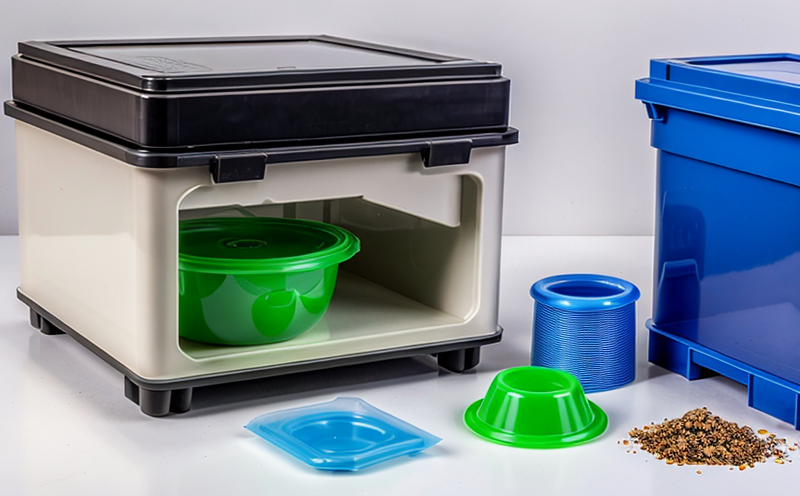ISO 868 Hardness Shore D Testing of Plastics Packaging
The ISO 868 hardness test using the Shore D scale is an essential method for determining the hardness of thermoplastic materials commonly used in packaging applications. This test measures the resistance to indentation and provides a quantitative measure that helps ensure quality control, compliance with industry standards, and product performance.
The Shore D hardness test is widely recognized across various industries, including food packaging, pharmaceuticals, consumer goods, and more. By measuring the Shore D hardness of plastic materials used in packaging, manufacturers can verify that their products meet critical specifications for durability, safety, and functionality under real-world conditions.
During this testing process, a specific type of durometer indenter is used to measure the resistance to indentation on the surface of the sample. The test involves applying force gradually until the indenter reaches a specified depth, after which the hardness value is determined based on the distance from the initial point.
The Shore D scale ranges from 0 to 100, with higher values indicating greater resistance to indentation and thus harder materials. This range allows for precise measurement of various plastic types used in packaging, such as polyethylene (PE), polypropylene (PP), polystyrene (PS), and other thermoplastics.
Accurate Shore D hardness testing ensures that the packaging material is not only durable but also meets stringent safety requirements. For instance, food-grade packaging must withstand specific mechanical stresses without compromising its integrity or contaminating the contents. Similarly, pharmaceutical packaging requires a balance between strength and flexibility to protect the product during transport.
In addition to quality assurance, Shore D hardness testing plays a crucial role in research and development (R&D). Engineers can use this data to optimize material formulations for improved performance, such as increased toughness or better resistance to environmental factors like heat or moisture. This information is invaluable for developing new products that meet evolving market demands.
Moreover, the results of Shore D hardness testing are often used during procurement processes to select suitable materials from suppliers who can provide consistent quality and performance. By specifying the required Shore D range in purchase orders, buyers ensure that they receive high-quality packaging components that will contribute positively to their overall product offerings.
Standardization through ISO 868 ensures consistency across different laboratories worldwide, facilitating international trade and collaboration between manufacturers and suppliers. Compliance with this standard guarantees that the testing methods used are reliable and reproducible, which is crucial for maintaining trust within the industry.
In summary, Shore D hardness testing of plastics packaging is a vital tool for ensuring product quality, safety, and performance across numerous industries. Its standardized approach provides consistent results globally, supporting both compliance with regulatory requirements and innovation in material science.
Eurolab Advantages
- State-of-the-art equipment ensuring precise measurements
- Experienced technicians with extensive knowledge of polymer testing
- Comprehensive quality assurance processes to maintain accuracy and reliability
- Accurate results delivered quickly, enhancing productivity for clients
Competitive Advantage and Market Impact
By offering ISO 868 hardness Shore D testing services, Eurolab positions itself as a leader in polymer and plastics testing. Our advanced laboratory facilities equipped with cutting-edge instrumentation allow us to provide highly accurate and reliable results that meet the highest industry standards.
Our experienced team of professionals combines years of expertise in materials science with rigorous quality control measures to ensure consistent, repeatable outcomes. This capability not only enhances our reputation but also provides significant competitive advantage by helping clients stay ahead of regulatory changes and market trends.
The ability to offer such specialized testing contributes directly to the overall success of Eurolab’s clients. For example, food packaging companies can use these results to improve product safety and shelf life, while pharmaceutical firms can ensure that their containers meet stringent quality criteria. These insights enable better decision-making throughout the supply chain, ultimately leading to enhanced customer satisfaction and increased profitability.
In addition, our commitment to innovation ensures that we are always at the forefront of technological advancements in this field. By leveraging the latest testing techniques and technologies, Eurolab continues to deliver value-added services that drive business growth for our clients.
Use Cases and Application Examples
- Food Packaging: Ensuring the durability of packaging materials used in food products, particularly those exposed to heat or moisture.
- Pharmaceutical Packaging: Verifying that containers meet stringent quality standards for protecting medicines during transportation and storage.
- Consumer Goods: Developing robust packaging solutions for various consumer items, ensuring they can withstand handling and environmental conditions.
- Automotive Industry: Evaluating the performance of plastic components in automotive parts that require high resistance to indentation.





